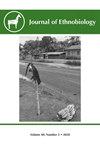Identifying Plants as a Process of Cultural Cognition: Comparing Knowledge Production and Communities of Practice in Modern Botanical Science and Nuaulu Ethnobotany
IF 1.3
3区 社会学
Q1 ANTHROPOLOGY
引用次数: 1
Abstract
We all seek to identify plants in our ordinary lives, or as professionals, yet what we mean by ‘identifications’ and our intentions in seeking them are not always the same. Moreover, the ‘identifications’ we achieve are often subject to disagreement. This paper compares the practices of contemporary professional taxonomists in producing herbarium reference collections, and plant naming among Nuaulu subsistence cultivators in eastern Indonesia. I examine how these communities of practice differ as groups and among themselves in the identifications they make of plants. I argue that the differences between them arise from the way material presents itself in radically different socio-cultural contexts, and the purposes for which the identifications are made. Differences between the groups arise from the ways individuals prioritise different kinds of information as it becomes available. Ethnobotanists often seek to translate between different worlds of identification by seeking one-to-one correspondences between scientific and local categories that we describe as taxa, but sometimes fail because the material used to identify plants, and the purposes of identification, are so different. I conclude by asking how intra-cultural and cross-cultural translation might operate in in-between hybrid spaces, such as para-taxonomy, where different assumptions and practices overlap or collide.识别植物作为文化认知的过程:比较现代植物学和努奥鲁民族植物学的知识生产和实践社区
我们都在日常生活中或作为专业人士寻求识别植物,但我们所说的“识别”和我们寻找它们的意图并不总是一样的。此外,我们所达成的“认同”往往存在分歧。本文比较了当代专业分类学家在制作植物标本馆参考集和印尼东部努奥卢自给栽培者植物命名方面的做法。我研究了这些实践群体在对植物的识别方面是如何作为群体和彼此之间存在差异的。我认为,它们之间的差异源于材料在完全不同的社会文化背景下的表现方式,以及识别的目的。群体之间的差异源于个人在获得不同类型的信息时对其进行优先排序的方式。民族植物学专家经常试图通过在我们称为分类群的科学类别和地方类别之间寻求一一对应来在不同的鉴定世界之间进行翻译,但有时会失败,因为用于鉴定植物的材料和鉴定目的非常不同。最后,我想问一下,在不同的假设和实践重叠或冲突的混合空间中,文化内和跨文化翻译可能如何运作,比如准分类学。
本文章由计算机程序翻译,如有差异,请以英文原文为准。
求助全文
约1分钟内获得全文
求助全文
来源期刊

Journal of Ethnobiology
Social Sciences-Anthropology
CiteScore
4.80
自引率
3.40%
发文量
21
审稿时长
>12 weeks
期刊介绍:
JoE’s readership is as wide and diverse as ethnobiology itself, with readers spanning from both the natural and social sciences. Not surprisingly, a glance at the papers published in the Journal reveals the depth and breadth of topics, extending from studies in archaeology and the origins of agriculture, to folk classification systems, to food composition, plants, birds, mammals, fungi and everything in between.
Research areas published in JoE include but are not limited to neo- and paleo-ethnobiology, zooarchaeology, ethnobotany, ethnozoology, ethnopharmacology, ethnoecology, linguistic ethnobiology, human paleoecology, and many other related fields of study within anthropology and biology, such as taxonomy, conservation biology, ethnography, political ecology, and cognitive and cultural anthropology.
JoE does not limit itself to a single perspective, approach or discipline, but seeks to represent the full spectrum and wide diversity of the field of ethnobiology, including cognitive, symbolic, linguistic, ecological, and economic aspects of human interactions with our living world. Articles that significantly advance ethnobiological theory and/or methodology are particularly welcome, as well as studies bridging across disciplines and knowledge systems. JoE does not publish uncontextualized data such as species lists; appropriate submissions must elaborate on the ethnobiological context of findings.
 求助内容:
求助内容: 应助结果提醒方式:
应助结果提醒方式:


